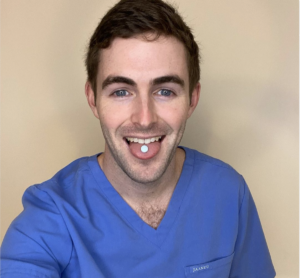The photo was simple: a man in blue scrubs against a beige wall with a blue pill in his mouth.
The caption was anything but.
“My name is Dr. Jake. I’m a physician who treats mental illness, and I take medication for my mental health. And by the way, I’m proud of it.”
Dr. Jake Goodman knew he’d shake things up with his TikTok post in December 2021. But he didn’t know just how much until his phone started blowing up.
“Thank you for posting that.” “I also experience a mental health issue, and your post made me feel less alone.” “This post was the push that I needed to go to therapy.”
And perhaps the most powerful, “This post helped save my life.”
Goodman BSA ’15, MBA ’20 had been struggling for a while. A well-known advocate for mental health and one of the most followed physicians on social media with more than 1.5 million followers, Goodman seemed to have it all.
He was young, successful, a doctor. But he wasn’t happy.
He started withdrawing from his family and avoiding the activities he used to enjoy.
Then one day, a fellow resident and friend told him he might be depressed.
“That woke me up,” Goodman says. “I was, like, I’m absolutely depressed. I’m meeting all the criteria for depression. I diagnose people with this every day, and I didn’t even recognize it in myself.”
He sought help, first through a therapist he continues to see every other week, and then with a fellow psychiatrist. He started medication and slowly began to feel more like himself again.
“The best way I can describe it is that I was living in a black and white world when all of a sudden, a few months later, I put on glasses and could see in color again.”
By that point, he had already racked up more than a million followers on social media, where most of his posts focused on sharing health information, demystifying mental health struggles and treatments, and making medicine—and doctors—more approachable.

A photo Dr. Jake Goodman posted of himself on social media to share his personal struggle with mental health and open positive conversation around the topic. (Photo/courtesy)
“I thought to myself, wouldn’t it be powerful if I shared this story? Would I be able to reach people who are suffering in silence right now and tell them that they’re not alone in what they’re going through? And that reaching out for your mental health is not a weakness, but it’s a strength?” Goodman says. “So I hit post.”
That’s when Dr. Jake went viral. Really viral. Which wasn’t the goal but was definitely encouraging for someone whose personal brand is built on fighting stigma and empowering people to get help when they need it.
And that includes his fellow physicians, residents, and medical students.
“The annual prevalence of depression in med students and residents is one in four. And studies show that one in nine trainees, so residents and med students, experience suicide ideation or thoughts of ending their lives,” Goodman says. “Those numbers are staggering. And when I first got into medical school, I didn’t know that. So when I started experiencing anxiety in medical school, I felt very alone in that process.”
I invest the time on social media because I know there’s somebody out there who sees my videos, and it has a life-changing impact on them. If it’s one person, it’s one person; if it’s a hundred, it’s a hundred. But that’s why I still, and always will, spend the time to create these types of videos to help people.” — Dr. Jake Goodman
Now Goodman is determined to make sure others don’t feel that way.
“On social media, you can reach somebody that will never, ever step foot in a psychiatric office, in a therapist office, maybe even in a doctor’s office,” says Goodman, who goes by @jakegoodmanmd on TikTok, Instagram, YouTube, and Twitter. “My goal is to empower those viewers to realize that they’re not alone in what they’re going through and to educate them about the illness.
“I invest the time on social media because I know there’s somebody out there who sees my videos, and it has a life-changing impact on them. If it’s one person, it’s one person; if it’s a hundred, it’s a hundred. But that’s why I still, and always will, spend the time to create these types of videos to help people.”







